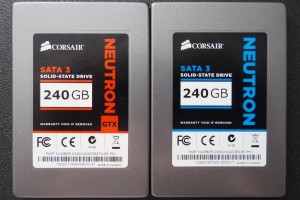NEUTRON COMPONENTS
The exterior shell of the both versions of the Corsair Neutron is constructed of a solid metal and, once opened, the PCB is fastened to the base plate by way of three screws.

 Something that is very refreshing to see is that the case itself is only held together by three grooves on the sides and no removal of screws is necessary to disassemble the unit. It simply snaps apart and then back together by sliding a pocket knife blade in the side.
Something that is very refreshing to see is that the case itself is only held together by three grooves on the sides and no removal of screws is necessary to disassemble the unit. It simply snaps apart and then back together by sliding a pocket knife blade in the side.
Both versions of the Neutron contain the LAMD LM87800 controller as well as two modules of Samsung DDR2-800 128MB DRAM cache for a total of 256MB of cache. The 240GB GTX contains eight 32GB modules of Toshiba Toggle Mode 24nm NAND flash memory while the Neutron contains 16x16GB modules of Micron 25nm synchronous memory.
The back of the GTX is void of any memory and only contains the Samsung cache module while the 240GB Neutron contains the eight remaining modules of Micron memory. In looking at the model number of the Micron memory, we know it is synchronous as the last three letters are ‘AAB’. If they were ‘AAA’, it would mean that the more value driven and lower performing asynchronous memory was in use.
Much like SandForce driven SSDs, over provisioning and firmware needs necessitate a certain amount of proprietary storage which accounts for the capacities of 120 and 240GB, rather than the typical 128 and 256GB capacities we have seen in all ‘non’SandForce’ SSDs prior. Once formatted, the 240GB Neutron and Neutron GTX both have an available user capacity of 224GB.
 The SSD Review The Worlds Dedicated SSD Education and Review Resource |
The SSD Review The Worlds Dedicated SSD Education and Review Resource | 
Glad to see another SSD controller apart from Marvell that doesn’t flop under incompressable data like Sandforce does.
My next SSD will likely be a 512GB. As soon as the prices come down to $400.
some crucial m4 and sandisk 512/480gb ssd already went to 389 and 359.
the prices are 399.99 and less for some good ones
Today you can get a Crucial M4 right here at the forum store for 349.00 ,512gb.
Superb review and great shoot on picture 🙂
Great review. Thanks so much! Will look to budget one of these into my next build.
Nice review indeed.
Only one thing>they are not sata 6,else perfect 🙂
all tests are to simple for me. You did not write if neutron caches data in DRAM, what happen if power ist lost. how disk will work in real world not just brand new out of the box?
look to storagereview or anandtech tests. they try to look deeper into the subject.
not all users are buing ssd to test how fast it can write one big file to laptop. many people uses SSD as smart cache for HHDs. are neutrons good for that?